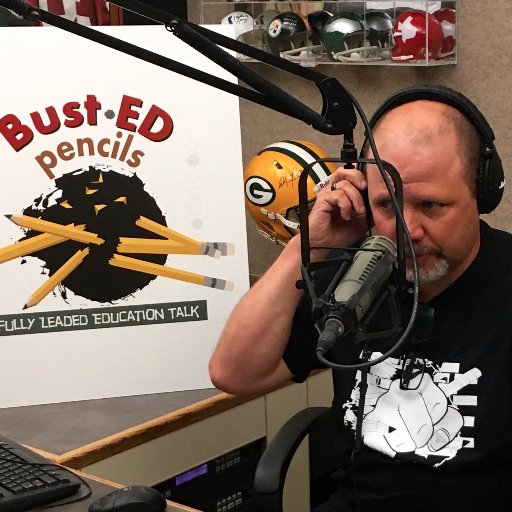You have /5 articles left.
Sign up for a free account or log in.
 Tim Slekar is the former dean of the School of Education at Edgewood College in Madison, Wis. Tim is now consulting in higher education with academic units that want to put in place strategic plans that are based in equity and justice. And he hosts BustED Pencils Live every Tuesday night at 7:00 p.m. Central. He graciously agreed to answer my questions.
Tim Slekar is the former dean of the School of Education at Edgewood College in Madison, Wis. Tim is now consulting in higher education with academic units that want to put in place strategic plans that are based in equity and justice. And he hosts BustED Pencils Live every Tuesday night at 7:00 p.m. Central. He graciously agreed to answer my questions.
Q: We met when you had me and Eddie Maloney on your radio show/podcast, BustedPencils. What is BustedPencils, and how did an academic like you end up doing progressive talk radio?
A: When I started my career as a junior professor, I was invited to talk on a conservative radio show about No Child Left Behind. It was an interesting experience since I was the "liberal college professor" exposing myself on conservative talk radio. However, after a few questions from the host and my rather pointed critique of NCLB, the callers would make comments like "I actually find myself agreeing with you." "You don't sound like a liberal." etc. I was invited back to the show for a once-a-week segment called education Thursdays. I enjoyed the discussion and felt comfortable with the format and the dialogue. That was when I realized that education policy needed to be stripped of academic jargon and removed from the political talking heads. The discussion needed to be reframed and given back to the citizens and families that deal with education policy on a daily basis.
Also, it was during this time that I started to see the damage NCLB was doing to my son Luke (he was really starting to hate school) and I started thinking about the possibility of opting him out of NCLB testing. I started writing for Huff Post and eventually published this piece. I made the decision to go through with the opt out and ended up on local television, CNN and Fox. Again, I had the experience of talking about education policy and finding more people engaging with me or even thanking me for speaking out.
At the same time, I found a kindred spirit in academe who was also writing for Huff Post, and he had the idea to do a live podcast on Blogtalk Radio. It was called At the Chalkface. We both came out of a punk rock background and decided to give the show an unapologetic edge that deeply promoted public schools and framed most of the issues around a justice and equity theme.
A few years later I moved to Madison, Wis., to become the dean of a School of Education and met up with a college fraternity brother -- Randy Hawke -- who was an incredibly talented radio host, VP and producer. He had heard some of my earlier podcasts and together we decided to create a professionally produced podcast. We weren’t sure of what to call it so one night my wife (Michelle) and I were brainstorming. We knew we wanted “pencils” in it, but we wanted an edge and something that made people remember it. That’s when Michelle said “busted.” “But put the ED in caps to really claim education.” It was perfect! BP was a podcast dedicated to interviewing a diversity of guests that could provide insight into the issues that were front and center in public education but were being framed by mainstream media as either deeply flawed or a simple two-sided point of view discussion with no real correct answer. We had a vision of producing a podcast that was witty and gritty and jargon-free -- no NPR stuff. What I wanted more than anything was for people outside education and academe to listen and say to themselves, “Wow, I didn’t know that.”
That was the real reason why an “academic” like me ended up doing progressive talk radio. What I can say now is that it is so important academe learn how to engage the public. It is needed now more than ever. Fifty percent of the American population has a negative perception of higher education. I get it. We are horrible at telling our story. We get too caught up in nuance and come across sometimes as condescending. That’s fine for academic conferences and journals, but it doesn’t work when we try to engage “our neighbors.” So now that’s why BustED Pencils is a live radio show in Madison, Wis., on Tuesday nights at 7:00 p.m. Central on Devil Radio 92.7 FM with my cohost, Johnny Lupinacci.
Q: I want to dig a bit more into career stuff. You’ve been a professor, a dean, a consultant and a talk radio host. Can you draw lessons from your academic career to others looking to perhaps follow a nontraditional path?
A: I started to say this earlier, but it might be easier to think about nontraditional paths as incredible opportunities. We need to engage deeply with citizens and the public. For me going from professor to talk radio host was simply making sure that the deep knowledge and passions that I have for education were able to be expressed with others outside academe.
Education policy way too often is made outside of the incredible expertise we as academics possess. That’s a huge problem. We can pontificate from our ivory towers about how policy makers don’t listen to us or we can step out of the tower. We can drop the nuance, get edgy and witty, and start to drive the policy conversations instead of watching and complaining from above. So I don’t think it’s really nontraditional to be a talk radio host. It’s essential in fulfilling our missions.
Q: From your perspective, how do you see higher education changing once the pandemic is over? Where do you think we need to go from here?
A: I wouldn’t use change to describe the future of higher education. I see it more as a choice. One choice will be to try like hell to get back to “normal.” The other choice will be to see that “normal” really wasn’t working before the pandemic and therefore innovative opportunities are going to required “changes” for institutions that want to thrive in a post-pandemic world.
Higher education cannot simply try to hustle as many students into degree programs as possible to balance the budget. Demographically we know they (students) aren’t going to be there. Therefore, we need to start seeing the work we do as a service that supports the educational needs of multiple and diverse populations. Higher education needs to focus on future students with an empathetic lens. What do they need? What are their desires and passions? What obstacles are in their way? How can higher education step up and serve so many that will have such differing needs?
The pandemic has shown us that at a minimum we can change the delivery mode. However, how does higher education use this forced evolution of delivery to provide access to a higher education that is flexible and nimble? And, then who is going to be the first to come on BustED Pencils to tell the new story of higher education that serves the needs of our students?








